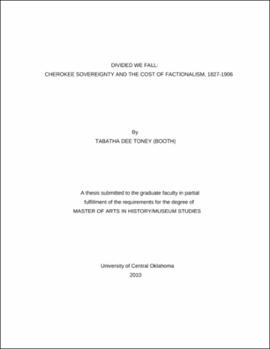| dc.contributor.advisor | Loughlin, Patricia | |
| dc.contributor.author | Booth, Tabatha Toney | |
| dc.date.accessioned | 2020-05-26T20:34:32Z | |
| dc.date.available | 2020-05-26T20:34:32Z | |
| dc.date.issued | 2010 | |
| dc.identifier.other | (AlmaMMSId)9974615285202196 | |
| dc.identifier.uri | https://hdl.handle.net/11244/324628 | |
| dc.description.abstract | As a tribe, the Cherokees interacted with Europeans early in American history. From initial contact, tribal sovereignty became an issue during trade and land negotiations. The tribe began with full autonomy that required European nations to parlay treaties as they would with other countries. As the United States became an independent force, Cherokee sovereignty faced its biggest threat as the federal government demanded land, political power, and submission. Disagreements and factions within the tribe further enabled the U.S. to capitalize on the situation and reduce self determination until its dissolution in 1906. The thesis covers the Cherokee struggle for sovereignty and the effect of internal factionalism, beginning with removal in the 1830s and ending with the termination of federal recognition of their tribal government in 1906. In each era, internal fissures enabled the U.S. government to capitalize on the lack of a united front to gain greater ground in reducing Indian autonomy. The thesis begins with Indian removal and the important Supreme Court cases, The Cherokee Nation v. Georgia and Worcester v. Georgia, ending with the Trail of Tears. The next chapter portrays the experience in Indian Territory, with the explosion of political violence and resulting federal intervention. The section also chronicles the Civil War, which reopened factional lines and enabled the harsh Treaty of 1866. Lastly, the thesis closes with the allotment period, 1880-1906, which divided tribal land, attacked traditional culture, and ended the Cherokee government and sovereignty. 2 The thesis does not focus on whether these events remained inevitable. Instead, it analyzes the effect of internal fighting and the consequences of division. Ultimately, factionalism enabled the U.S. reduce and eventually end Cherokee sovereignty. | |
| dc.rights | All rights reserved by the author, who has granted UCO Chambers Library the non-exclusive right to share this material in its online repositories. Contact UCO Chambers Library's Digital Initiatives Working Group at diwg@uco.edu for the permission policy on the use, reproduction or distribution of this material. | |
| dc.subject.lcsh | Cherokee Indians | |
| dc.subject.lcsh | Self-determination, National | |
| dc.title | Divided we fall : Cherokee sovereignty and the cost of factionalism, 1927-1906. | |
| dc.type | Academic theses | |
| dc.contributor.committeeMember | Pool, Carolyn | |
| dc.contributor.committeeMember | Watkins, Brad | |
| dc.thesis.degree | M.A., History - Museum Studies | |
| dc.identifier.oclc | (OCoLC)ocn671252880 | |
| thesis.degree.grantor | Jackson College of Graduate Studies | |
